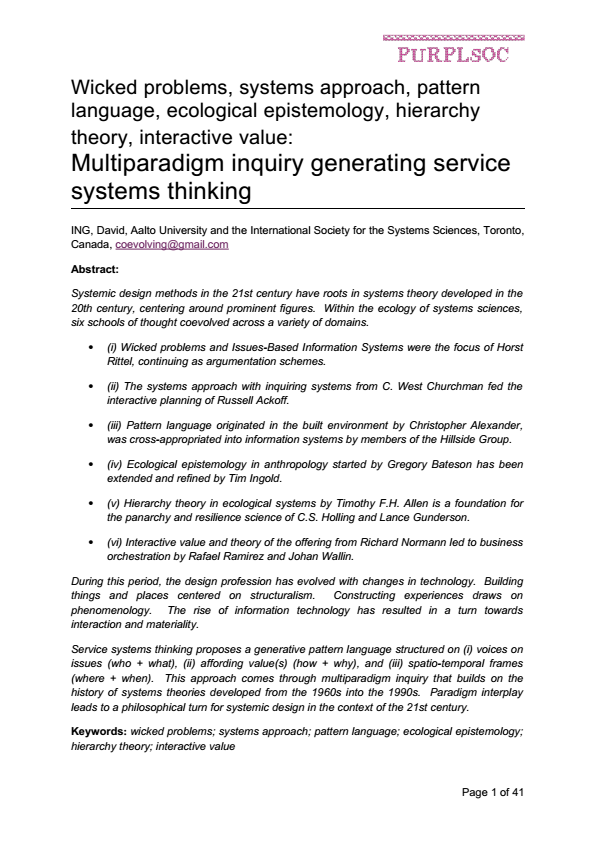What if a pattern language was opened up to contemporaneous research into wicked problems, the systems approach, ecological epistemology, hierarchy theory, and interactive value? This 30-minute presentation at Purplsoc 2017 last October aimed to provide a broader context to a social change community focused on works of Christopher Alexander.
This talk was a complement to “Pattern Manual for Service Systems Thinking” presented a year earlier, at PUARL 2016. Last year, the agenda was centered on the approach from Christopher Alexander, and divergences due to the changing in domain from the built environment to service systems.
The slides on the Coevolving Commons are dense. I had showed them at the poster session in the day preceding, and promised to spend more time speaking to them in the workshop scheduled for the next day.
For 2017, the view looked beyond Alexander, to related research both at Berkeley, and elsewhere in the systems community. The agenda was in 3 major sections (here expanded with more detailed overview of the middle section):
- 1. What is multiparadigm inquiry?
- 2. Where have (and might have) (1960s-2010s) paradigms influenced generative pattern language?
- a. Over 50 years, Christopher Alexander and coauthors evolved concepts and language in built environments
- b. At Berkeley: Churchman, Rittel and Alexander taught in 1960-1970s
- i. “Systems Generating Systems”, Alexander (1968)
- ii. “The Systems Approach and Its Enemies”, (Churchman, 1979)
- iii. “Dilemmas in a General Theory of Planning”, (Rittel + Weber, 1973)
- c. Architecture ~ problem-seeking. Design ~ problem-solving
- d. Wicked problems led to IBIS and argumentation schemes
- e. Systems approach led to assumption surfacing, postnormal science
- f. Pattern language has risen in agile, groups, public sphere
- g. Ecological epistemology led to interaction design + affordances
- h. Hierarchy theory led to panarchy and resilience science
- i. Interactive value is in the shift to a service economy
- 3. Why might a pattern language project or community pay more attention to its paradigm?
The slides have now been matched up with the digital audio recording, for viewing as a web video.
The classroom was acoustically favourable, and audio recordings are downloadable.
| Audio | |||
| Digital audio (31m04s) |
[20171020_Purplsoc_Ing mp3] (29MB) [20171020_Purplsoc_Ing 3db mp3] (volume boosted 3db, 29MB) |
||
Downloadable video files may be better for devices that disconnect from the Internet.
| Video | H.264 MP4 | WebM |
| Digital video (31m14s) |
[20171020 Purplsoc Ing HD m4v] (HD 592Kbps 134MB) [on the Internet Archive] [20171020 Purplsoc Ing nHD m4v] (nHD 495Kkps 111MB) |
[20171020 Purplsoc Ing HD webm] (HD 430Kbps 96MB) [20171020 Purplsoc Ing nHD webm] (nHD 196Kbps 44MB) |
My speaking was rapid, covering a lot in 30 minutes. For the more patient, the paper written for the proceedings may be easier to follow.
Approaching service systems from a multiparadigm approach expands the relevant body of research for pattern language beyond the original domain in just built environments.



